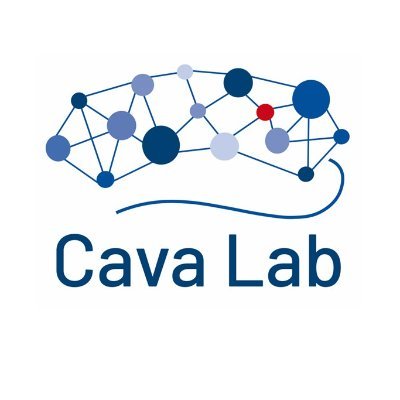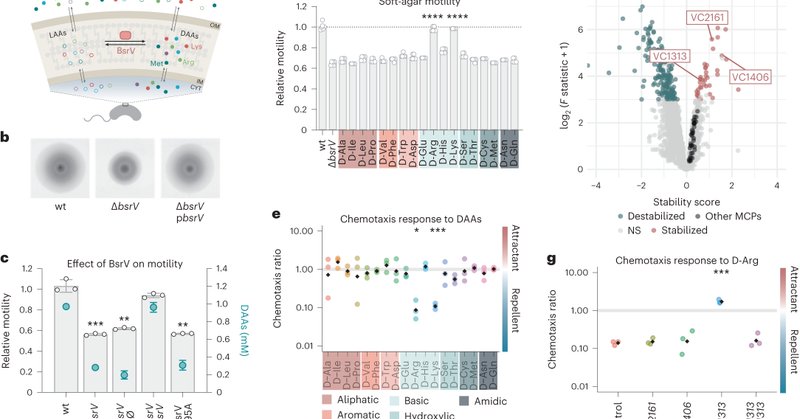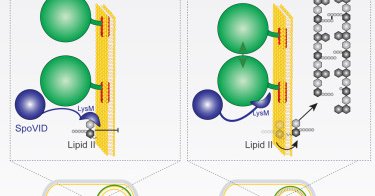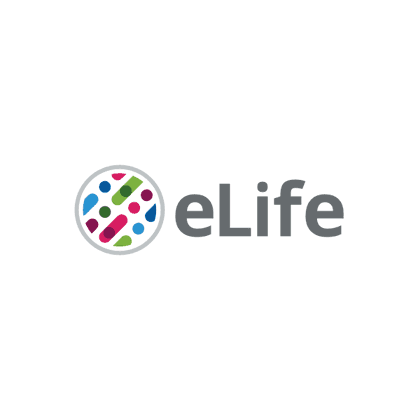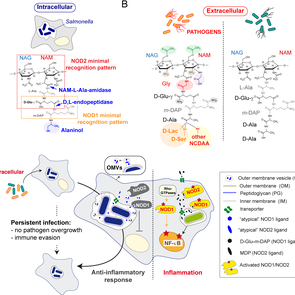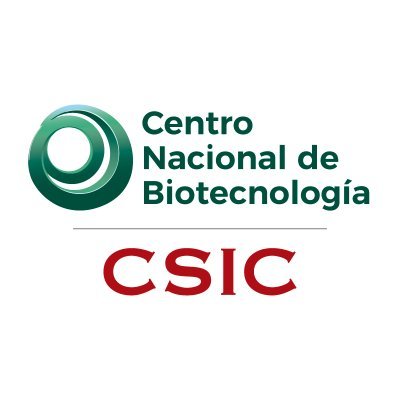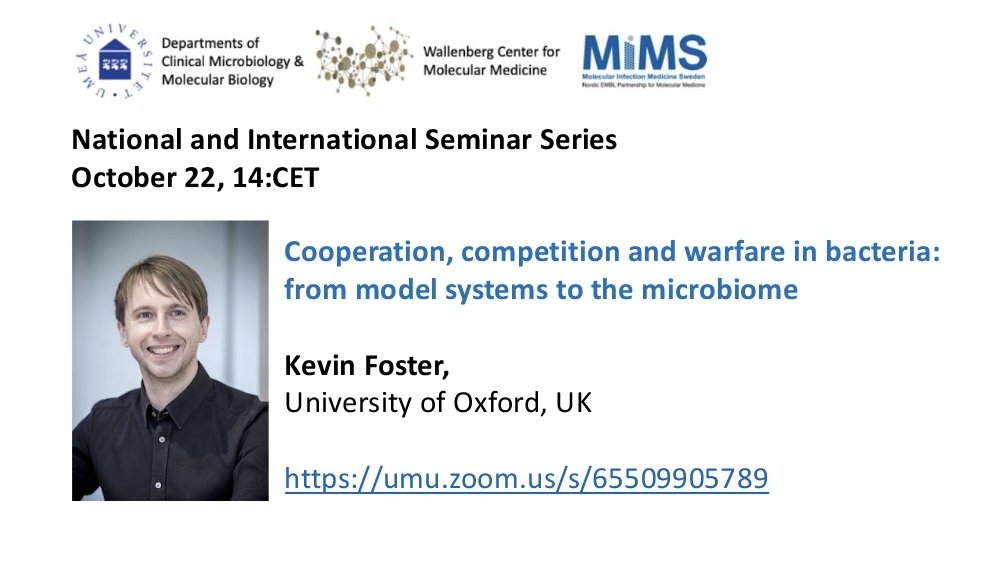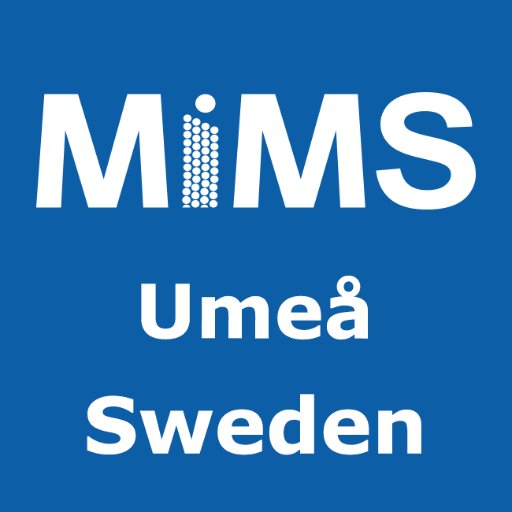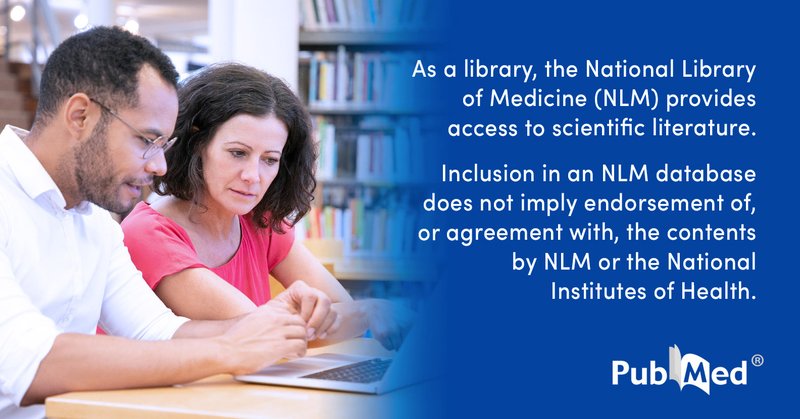
Felipecava.mims
@FelipecavaM
Followers
393
Following
138
Media
16
Statuses
134
MIMS (EMBL partner) group leader. Umeå univ. Sweden. Microbiologist, fascinated about all what bacteria are capable. interests: cell wall biology and genetics.
Umeå, Sverige
Joined September 2017
1/2. We are super excited to share our latest publication in @NatureComms, which identifies a new family of cell wall crosslinking enzymes broadly conserved in many bacteria:
1
12
67
2/2. This study was the result of a fantastic collaboration between our friends at the @BerntssonLab @mateusLab @TypasLab @savitski_lab @sourjik and the @CavaLab_MIMS @FelipecavaM at @mims_umea
@umeauniversity @Ucmr_sweden @embl @NordicEMBL @KAWstiftelsen @scilifelab
0
3
9
1/2. We are super excited to share our latest publication, which identifies a new role for D-amino acids in Vibrio cholerae chemotaxis: https://t.co/N6aZ9dlvNF
nature.com
Nature Microbiology - d-arginine and d-lysine are chemorepellent molecules sensed by a novel chemotaxis receptor in Vibrio cholerae that trigger a run-away response under adverse conditions.
7
40
125
Thomas Delerue's paper (>5 yrs in the making!) on a developmental checkpoint during bacterial cell surface morphogenesis is out online in @Dev_Cell! https://t.co/MArhONcy16 Check out his 2 min video explaining our model:
cell.com
The coordinated assembly of cellular structures is a hallmark of development. Delerue et al. identify a bacterial sporulation protein that sequesters a precursor molecule to halt assembly of one...
3
9
45
Bacteria from the Neisseriaceae family come in different shapes and flavors. Check out our new preprint, that describe some buccal symbionts with a strange way of dividing ()()()().@inrsciences A team work with @bulgheresi_s, @BrunLabCaulo
@FelipecavaM. https://t.co/dKZNsjMv2V
2
10
31
Our paper on lytic transglycosylases out in @eLife! Dispelling myths about LTG physiological role in a great collaboration with @CavaLab_MIMS. As a side note (unsurprising, but heretofore not firmly established): LTGs are indeed essential for viability. https://t.co/T0tgX3tun9
elifesciences.org
A critical role for bacterial lytic transglycosylases in the clearance of novel, toxic cell wall turnover products that accumulate during vegetative growth is identified through genetic approaches...
0
12
31
What do we know about peptidoglycan editing in intracellular Salmonella? https://t.co/IDdniIvU3F This work has been the result of a fantastic collaboration with our friends from the Garcia del Portillo "twitter-less" lab at the CNB in Spain.😉💪@mims_umea @CNB_CSIC @smcastanheira
journals.plos.org
Author summary The peptidoglycan, built as a giant polymer of glycan chains crosslinked with short peptides, is essential for cell shape and survival in most bacteria. Its unique chemistry is...
4
14
60
El grupo de @portillo_lab del #CNB en colaboración con @CavaLab_MIMS identifica un nuevo mecanismo de evasión inmune de #Salmonella específico del ambiente intracelular en el que se desarrolla https://t.co/8IbGSrTSNT El artículo de @PLOSPathogens: https://t.co/jxYuBWBPLK
0
5
13
We are thrilled to share this amazing work about undecaprenyl-phosphate recycling translocases: https://t.co/3oWLUrhLwC We are delighted to be part of this collaboration with the #WaldorLab
@sit_brandon @JeepSrisuknimit @HHMINEWS @HarvardMicro @mims_umea @UmeaUniversity
0
3
16
Look who's on the cover of @Dev_Cell:the humble soil bacterium #Bacillus subtilis,in the act of sporulating,depicted using marbles and wooden blocks! Our paper tackles a ~50 yr old mystery of how the cell coordinates assembly of 2 supramolecular structures: https://t.co/Okj9zcvHd3
8
15
114
Please RT, postdoc opportunity @CavaLab_MIMS! Interested in #signalling #structuralbiology #biofilms #vibrio cholerae, apply to join us with @BerntssonLab as part of Excellence by Choice #postdoc @Ucmr_sweden @UmeaUniversity. Find out more, project #4: https://t.co/kNQdt7Hrlk.
1
34
34
This Friday October 22nd we have Kevin Foster as invited speaker. Join us!
0
11
37
Open position: Postdoctoral researcher in Data-driven life science research at @UmeaUniversity, @IceLab_umea and @mims_umea! Infection, systems biology, machine learning. Computational biologists, bioinformaticians are welcome to apply! Contact: @FelipecavaM
0
13
10
This Friday seminar we have Alvaro San Millán taking about antimicrobial resistance. Join us! @mims_umea, @Ucmr_sweden, @UmeaUniversity @WCMM_UmU
0
4
17
Please RT! Take on a #postdocposition with IceLab,@FelipecavaM @CavaLab_MIMS. Apply your #systemsbiology and #machinelearning skills to identify proteins important to pathogenic baterial cell walls & fight #antimicrobialresistance. https://t.co/D6ks443F8H
0
10
4
Take on a #postdocposition with IceLab,@FelipecavaM, @nrs298 & @SFI_elibby. Apply your #systemsbiology and #machinelearning skills to identify proteins important to pathogenic baterial cell walls & fight #antimicrobialresistance. https://t.co/4CcSSjyy0w
0
8
5
Looking for a #postdoc and a way to stop #antimicrobialresistance - Join IceLab & @FelipecavaM & @nrs298 for this multidisciplinary fellowship using #systemsbiology and to identify proteins important to pathogenic baterial cell walls. Apply by Aug 31 https://t.co/T0WcsuMkqy
0
5
2
Happy to share my latest work in @MarioFeldman9 lab . We discovered a bifunctional PGase effector in A. baumannii that can digest the CW of both Gram (-) and (+) bacteria. Big thanks to co-author @JuvenalLopez20 and collaborators at @FelipecavaM lab. https://t.co/t01jqHWqCJ
1
7
48
Very excited to finally share our last paper by @lenghung8825 and @JuvenalLopez20 , in collaboration with @FelipecavaM lab. Killing of Gram-negative and Gram-positive bacteria by a bifunctional cell wall-targeting T6SS effector
pnas.org
The type VI secretion system (T6SS) is a powerful tool deployed by Gram-negative bacteria to antagonize neighboring organisms. Here, we report that...
3
29
116
It is out! 🥳 New publication of the Cava lab @CavaLab_MIMS @mims_umea @eLife about temperature-dependent regulation of biofilm in V. cholerae in collaboration with the Frederick lab (Ohio state); the Waldor lab (Harvard) and the Benes lab @embl. https://t.co/Aa0O36d1hF
pubmed.ncbi.nlm.nih.gov
Adaptation to shifting temperatures is crucial for the survival of the bacterial pathogen Vibrio cholerae. Here, we show that colony rugosity, a biofilm-associated phenotype, is regulated by temper...
0
8
35

